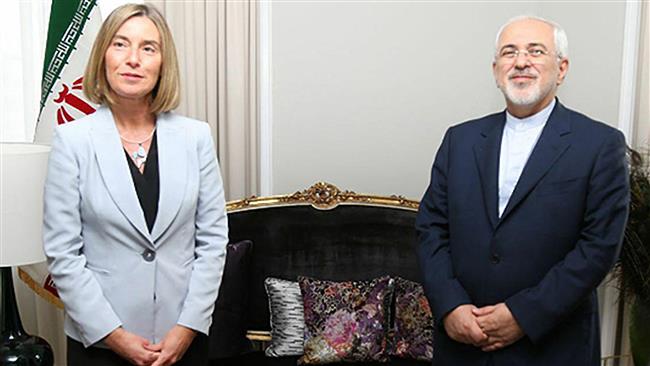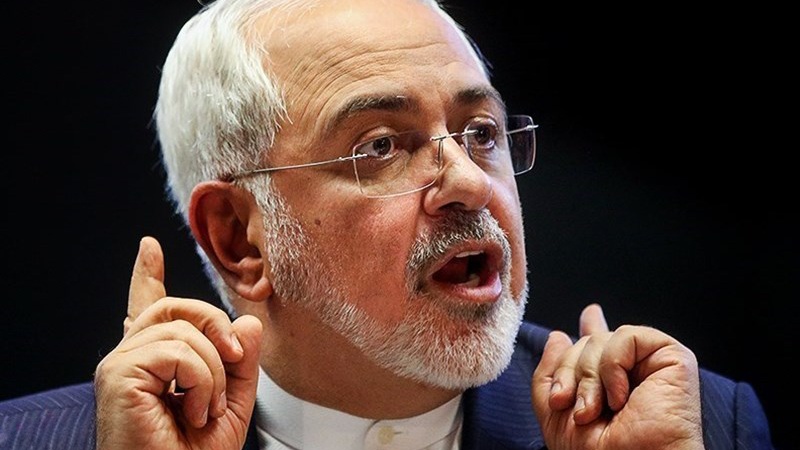Alwaght- Iran blamed Saudi Arabia over supporting terrorist groups along the Islamic Republic's borders.
"We have intelligence that Saudi Arabia is actively engaged in promoting terrorist groups on the eastern side of Iran, in Baluchistan," Iranian foreign Minister told a news conference held on the sidelines of the Oslo Forum in Norway.
Sistan and Baluchestan is the largest province of Iran and shares borders with Pakistan and Afghanistan.
"On the Western side, the same type of activity is being undertaken, again abusing the diplomatic hospitality of our other neighbor," Mohhamad Javad Zarif added, without elaborating.
The Iranian top diplomat referred to Saudi officials' remarks that predicted terrorist attacks in the Iranian capital city of Tehran, calling those “direct threat and very dangerous provocation”.
Last month, Saudi Defense Minister Mohammed bin Salman said in vague remarks that Saudi Arabia would work to move “the battle” to Iran. Then, on June 6, Saudi Foreign Minister Adel al-Jubeir said Iran had to be “punished” for what he called “its interference in the region.”
Just hours later, early in the morning of July 7, twin terrorist attacks struck the Iranian capital. A total of 17 people were killed and nearly 50 others were wounded in the terrorist attacks. The terrorist group of ISIS, which is closely associated with the extremist Wahhabi ideology preached by Saudi Arabia, claimed responsibility for both attacks.
Separately Deputy Chief of Staff of Iran's Armed Forces Brigadier General Massoud Jazayeri blamed the US and its oil-rich ally, Saudi Arabia for the coordinated attack in Tehran.
"Undoubtedly, such terror incidents are managed, directed and supported by Saudi Arabia and the US," Iran's chief Armed Forces spokesman Jazayeri said.
‘US ignoring Saudi role in terror’
Elsewhere in his remarks, Zarif said the United States under President Donald Trump was turning a blind eye to Saudi Arabia’s role in the 9/11 terrorist attacks in the US, which killed some 3,000 people, and other attacks elsewhere in the West.
On September 11, 2001, 19 terrorists — 15 of them Saudi nationals — engaged in a multi-pronged attack on US soil, including hijacking passenger planes and crashing them into what were then the twin towers of the World Trade Center in New York City.
In Oslo, Zarif said in figurative remarks that Trump was seeking to change the nationality of the 15 Saudi assailants or every other bomber who has attacked the US or Western countries over the past 20 years postmortem.
The US is “trying to change... history,” he said.
Meeting with Mogherini
Earlier on Monday, Zarif met and held talks with the European Union (EU)’s foreign policy chief, Federica Mogherini, on a range of issues, including the 2015 multilateral nuclear deal with Iran.

Iranian Foreign Minister Mohammad Javad Zarif (R) meets with the European Union (EU)’s foreign policy chief, Federica Mogherini, in Oslo, Norway, June 12, 2017.
Minister Zarif and High Representative Mogherini exchanged views on international and regional issues as well as the nuclear accord, officially called the Joint Comprehensive Plan of Action (JCPOA), in the Norwegian capital, Oslo, on Monday.
On his arrival at the Oslo Airport, Zarif told reporters that he had sent two messages to Mogherini in the past few weeks about the US’s failure to live up to its commitments under the JCPOA and the consequences of Washington’s “destructive policies” in that regard.
The issue had been discussed in the latest session of a joint commission that monitors the implementation of the JCPOA and would be on the agenda of the commission’s future meeting, he said.
The top Iranian diplomat also stressed that the JCPOA was currently being implemented in its natural manner as the Islamic Republic and the EU member states were committed to the deal.
Zarif said the US’s failure to honor its obligations was not a new issue and that Iran had little economic interaction with the US beyond the purchases of aircraft, which he said proceeded well despite the US’s failure to perform in other areas.
Iranian airlines have placed orders for American-made Boeing aircraft worth a total of around 19.6 billion dollars, purchases made possible under the terms of the JCPOA. While attempts have been made at the US Congress recently to block the sale of those aircraft to Iran, the implementation of the deals between the Iranian airlines and Boeing seems to face no hindrance as the JCPOA is clear in that area.
Zarif also stressed that the US could not affect Iran’s relations with other countries.
The JCPOA was inked between Iran and the P5+1 group of countries, namely Russia, China, France, Britain, the US and Germany, in July 2015. Barring the new US administration, the governments in all of those countries have stressed the sustenance of the JCPOA.
The agreement took effect in January 2016. Under the deal, limits were put on Iran’s nuclear activities in exchange for, among other things, the removal of all nuclear-related sanctions imposed on the Islamic Republic.
The administration of US President Donald Trump, which took over in January this year, has been apparently opposed to the nuclear accord, which was negotiated under the former US administration.
The US Congress has been a stronger opponent of the deal, however. Last week, the US Senate voted overwhelmingly to advance a bill that would impose new sanctions on Iran over its missile program, which Tehran has repeatedly said is defensive, and analysts have expressed concern that the new US measure can undermine the JCPOA.
Zarif said the Senate’s move showed “the US’s short-sightedness” and was a sign of the “wrong policy” adopted by the US government. He said Iran would “definitely” react if a reaction was found warranted “based on the joint commission’s discretion.”
‘EU to continue to engage with Iran’
Later, speaking at a news conference, Mogherini said she was confident that the US would stick to the nuclear deal, despite its declarations to the contrary.
“I am confident that the review in the United States will bring [American statesmen] to wise decisions, which means keeping something that is working,” she said, referring to the Trump administration’s engagement in a review of whether to stick to the JCPOA or not.
“In any case,” Mogherini said, “the European Union will guarantee that the deal keeps, that we stick to that... and that our policy of engagement with Iran continues.”
The Iranian foreign minister has traveled to Norway to participate in the Oslo Forum, which gathers leading armed conflict mediation practitioners. On the sidelines, he is expected to hold more one-on-one meetings with participating dignitaries.



























